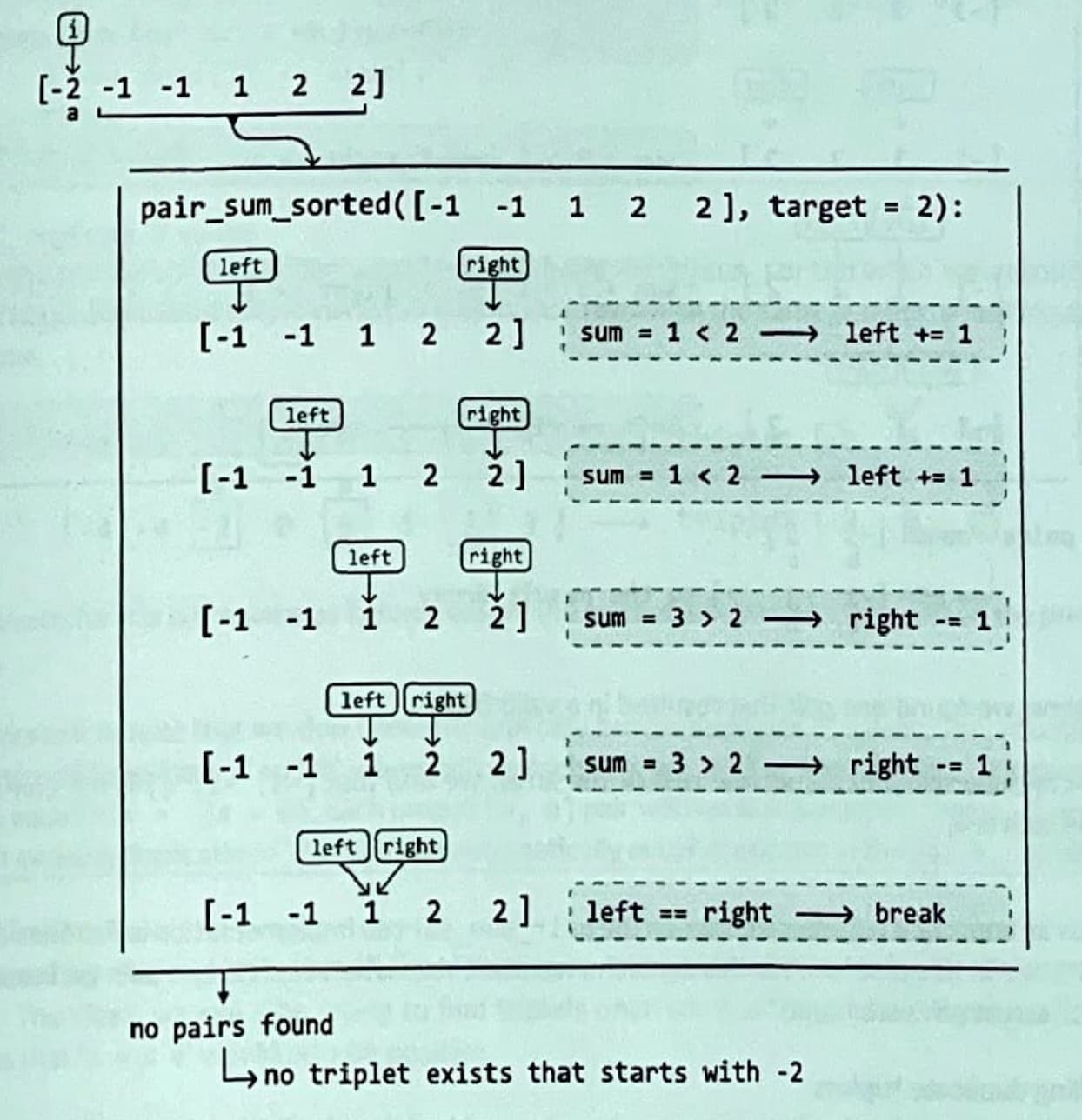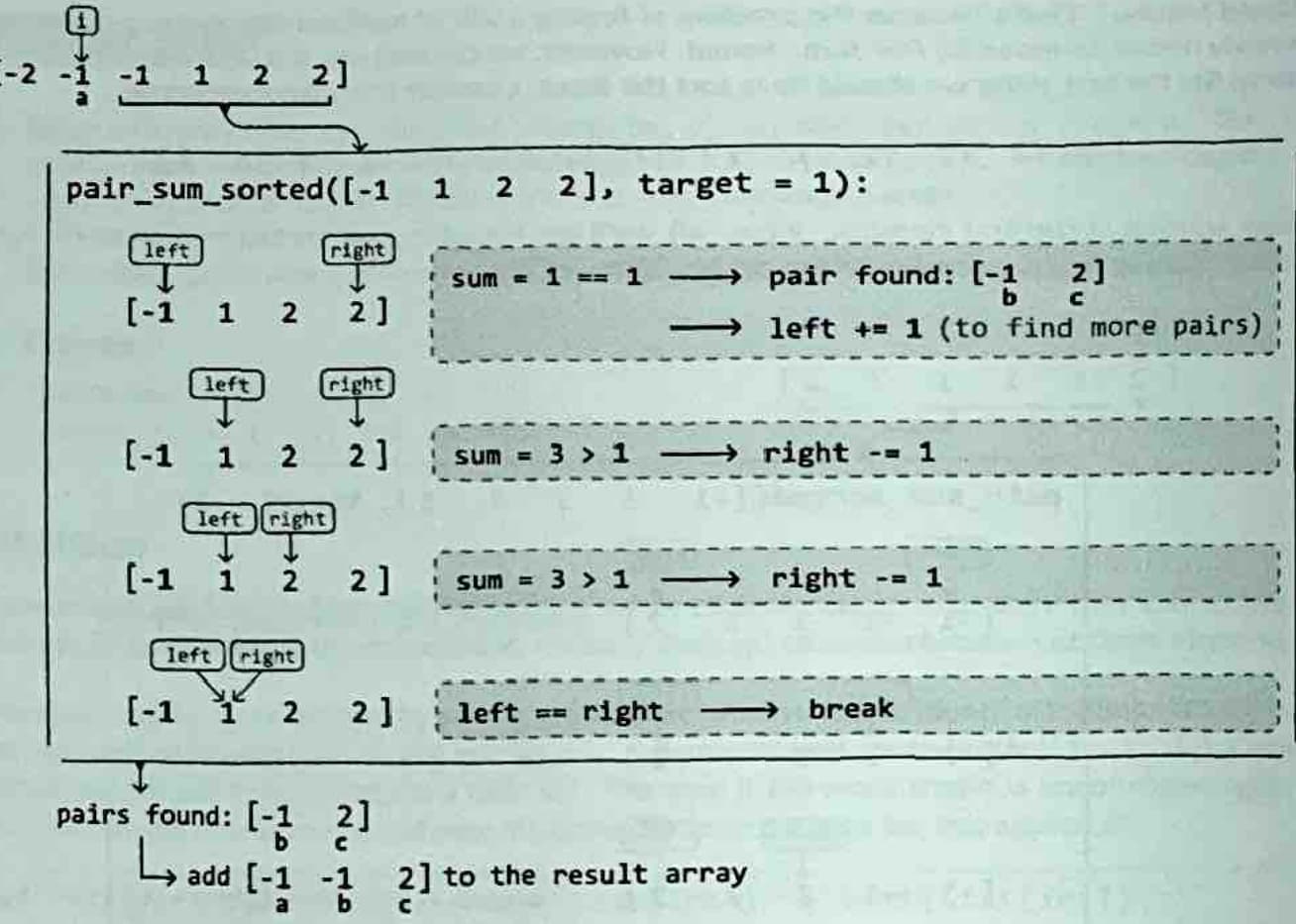Triplet Sum
Given an array of integers, return all triplets [a, b, c] such that The solution must not contain duplicate triplets (e.g, [1, 2, 3] and [2, 3, 1] are considered duplicate triplets).If no such triplets are found,return an empty array.
Each triplet can be arranged in any order, and the output can be returned in any order.
Example
Input: nums = [0, -1, 2, -3, 1] Output: [ [-3, 1, 2], [-1, 0, 1] ]
Intuition
A brute force solution involves checking every possible triplet in the array to see if they sum to zero. This can be done using three nested loops,iterating through each combination of three elements
Duplicate triplets can be avoided by sorting each triplet, which ensures identical triplets with different representations(e.g, [1, 3, 2] and [3, 2, 1] are ordered consistently ([1, 2, 3]). Once sorted, we can add the triplets to a hash set. This way, if the same triplet is encountered again, the hash set will only keep one instance.Below is the code snippet for this approach:
This solution is quite inefficient with a time complexity of where denotes the length of the input array. How can we do better?
Let's see if we can find at least one triplet that sums toO.Notice that if we fix one of the numbers in a triplet, the problem can be reduced to finding the other two. This leads to the following observation:
For any triplet [a, b, c],if we fix 'a', we can focus on finding a pair [b, c] that sums to '-a'
Sound familiar? That's because the problem of finding a pair of numbers that sum to a target has already been addressed by Pair Sum - sorted However, we can only use that algorithm on a sorted array. So, the first thing we should do is sort the input.Consider the following example:

Now, starting at the first element, -2 (i.e., 'a'), we'll use pair_sum_sorted method on the rest of the array to find a pair whose sum equals 2 (i.e.,'-a'):

As you can see, when we called pair_sum_sorted, we did not find a pair with a sum of 2. This indicates there are no triplets starting with -2 that add up to 0.
So, let's increment our main pointer, i, and try again.

This time, we found one pair that resulted in a valid triplet.
If we continue this process for the rest of the array, we find that[-1, -1, 2] is the only triplet whose sum is 0.
There's an important difference between the pair_sum_sorted implementation in Pair Sum-Sorted and the one in this problem:for this problem,we don't stop when we find one pair, we keep going until all target pairs are found.
Handling duplicate triplets
Something we previously glossed over is how to avoid adding duplicate triplets.There are two cases in which this happens. Consider the example below:
Case 1: duplicate 'a' values
The first instance where duplicates may occur is when seeking pairs for triplets that start with the same 'a' value:

Since pair_sum_sorted would look for pairs that sum to '-a' in both instances, we'd naturally end up with the same pairs and, hence, the same triplets.
To avoid picking the same 'a' value, we keep increasing i (where nums[i] represents the value 'a') until it reaches a different number from the previous one. We do this before we start looking or pairs using the pair_sum_sorted method. This logic works because the array is sorted meaning equal numbers are next to each other The code snippet for checking duplicate 'a' values looks like this:
Case 2: duplicate 'b' values
As for the second case, consider what happens during pair_sum_sorted when we encounter a similar issue. For a fixed target value ('-a'), pairs that start with the same number 'b' will always be the same:

The remedy for this is the same as before: ensure the current b value isn't the same as the previous value.
It's important to note that we don't need to explicitly handle duplicate 'c' values. The adjustments made to avoid duplicate 'a' and 'b' values ensure each pair [a, b] is unique. Since 'c' is determined by the equation c = -(a+b), each unique [a, b] pair will result in a unique 'c' value. Therefore, by just avoiding duplicates in 'a' and 'b', we automatically avoid duplicates in the [a, b, c] triplets.
Optimization
An interesting observation is that triplets that sum to cannot be formed using positive numbers alone. Therefore, we can stop trying to find triplets once we reach a positive'a' value since this implies that 'b' and 'c' would also be positive.
Implementation
From the above intuition, we know we need to slightly modify the pair_sum_sorted function to avoid duplicate triplets. We also need to pass in a start value to indicate the beginning of the subarray on which we want to perform the pair-sum algorithm. Otherwise, the two-pointer logic remains nearly identical to that of Pair Sum - Sorted.
Complexity Analysis
Time complexity: The time complexity of triplet_sum is .Here's why:
- We first sort the array, which takes time.
- Then, for each of the elements in the array, we call pair_sum_sorted_all_pairs at most once, which runs in time.
Therefore, the overall time complexity is
Space complexity: The space complexity is due to the space taken up by Python's sorting algorithm. It's important to note that this complexity does not include the output array triplets because we're only concerned with the additional space used by the algorithm, not the space needed for the output itself.
If the interviewer asks what the space complexity would be if we included the output array, it would be . This is because the pair_sum_sorted_all_pairs function, in the worst case, can add approximately n pairs to the output. Since this function is called approximately n times, the overall space complexity would be .
Test Cases
In addition to the examples already covered in this explanation, below are some others to consider when testing your code.
| Input | Expected output | Description |
|---|---|---|
| nums = [] | [] | Tests an empty array. |
| nums = [0] | [] | Tests a single-element array. |
| nums = [1, -1] | [] | Tests a two-element array. |
| nums = [0, 0, 0] | [0, 0, 0] | Tests an array where all three of its values are the same. |
| nums = [1, 0, 1] | [] | Tests an array with no triplets that sum to 0. |
| nums = [0, 0, 1, -1, 1, -1] | [-1, 0, 1] | Tests an array with duplicate triplets. |